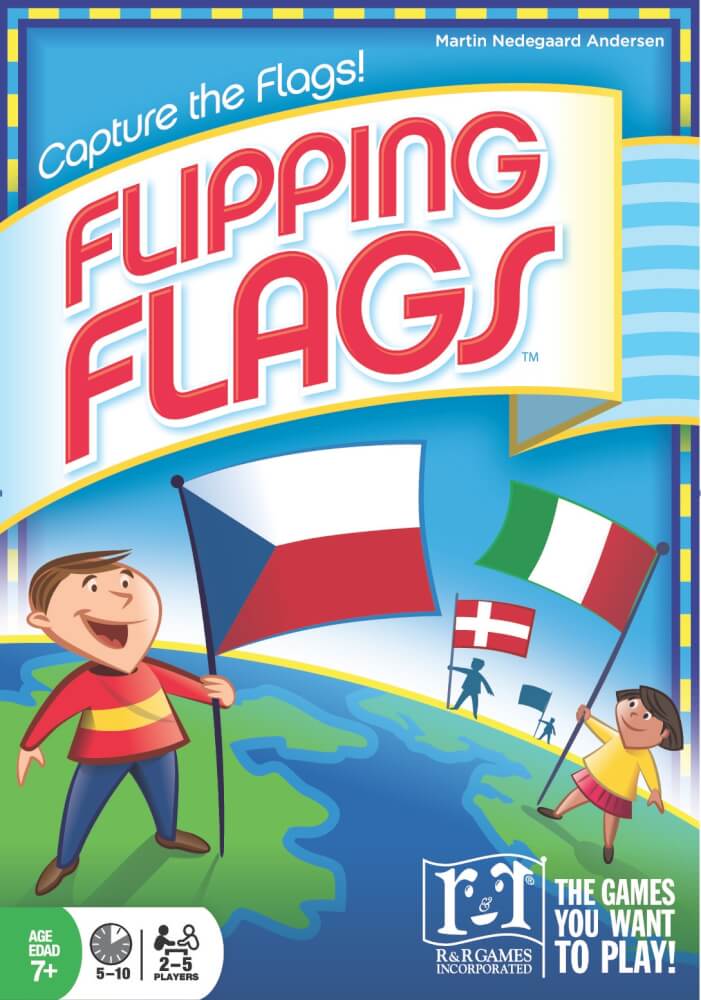
Flipping Flags
Are you a fan of flags and love quick challenges? Then Flipping Flags is the perfect choice for you! In this card game, your agility and knowledge of the world's flags will be put to the test. Players take turns flipping cards and, as soon as they spot a flag, they must quickly identify which country it belongs to. It's an exciting race to see who can remember and recognize the most flags. I remember a fun evening with friends, where we laughed and surprised each other with our memory - every card turned over was a new chance to team up and have a laugh. Flipping Flags is not only fun but also educational, ideal for parents looking to teach geography in a playful way. What's more, the game is easily transportable, which means you can take it with you to parties, trips or family gatherings. Get ready to challenge your friends and family and find out who the real flag expert is!Table of Contents
- How to Play
- Tips for playing
- Game mechanics
- Game components
- Additional Information
OBJECTIVE OF THE GAME
Tips for playing
Here are some tips for doing better in the game Flipping Flags:
1. **Get to know the flags: Familiarize yourself with the colors and patterns of the most common flags. This speeds up your visual recognition during the game. 2. **Practice visual memory: Use memorization techniques, such as image association, to retain flag information for longer. 3. **Focus on the subtle differences: Some flags are very similar. Pay attention to small details, such as the arrangement of stars or variations in tone. 4. **Create personal associations**: Relate certain flags to personal experiences or countries you have visited, this makes it easier to remember the unique characteristics. 5. **Challenge yourself regularly**: Get into the habit of playing for short intervals to gradually increase your proficiency. 6. **Use geography apps: There are many apps that help you practice and recognize flags. Explore them to complement your learning. 7. **Participate in online forums**: Share tips and learn from other players in communities dedicated to the subject. Social interactions can bring new perspectives. 8. **Study multiple games**: Flipping Flags can improve your visual memory, but trying other flag games can broaden your knowledge. 9. **Rest your mind: Don't forget to take breaks. A rested mind perceives details more clearly and accurately. 10. **Have fun: Look at the game as an opportunity to learn and have fun, not a competition. This makes the experience more enjoyable and less stressful.Video about the game
GAME mechanics
- Pattern Recognition - In Flipping Flags, the central mechanic revolves around the skill of pattern recognition. The player is presented with a series of flags from different countries and must correctly identify the pattern associated with each one, be it the colors, symbols or distinct shapes. The focus here is on sharpening the player's visual memory and geographical knowledge, making them able to easily differentiate between similar flags, such as those of Ireland and the Ivory Coast. This mechanic not only provides an intellectual challenge, but also an educational journey around the world. By quickly recognizing the patterns, the player earns points, evolving in the game and becoming a true master of global heraldry.
Game components
See all the items in the game below Flipping Flags:
- Color Beacons
- Challenge Cards
- Game Board
- Position markers
- Scoring pins
- Game rules
- Strategic Parts
- Action Dice
Additional Information
- Ludopedia link: https://ludopedia.com.br/jogo/flipping-flags
- Link Tabletopia:
- Amazon Brazil link: Comprar Flipping Flags
- Amazon USA link: Comprar Flipping Flags


